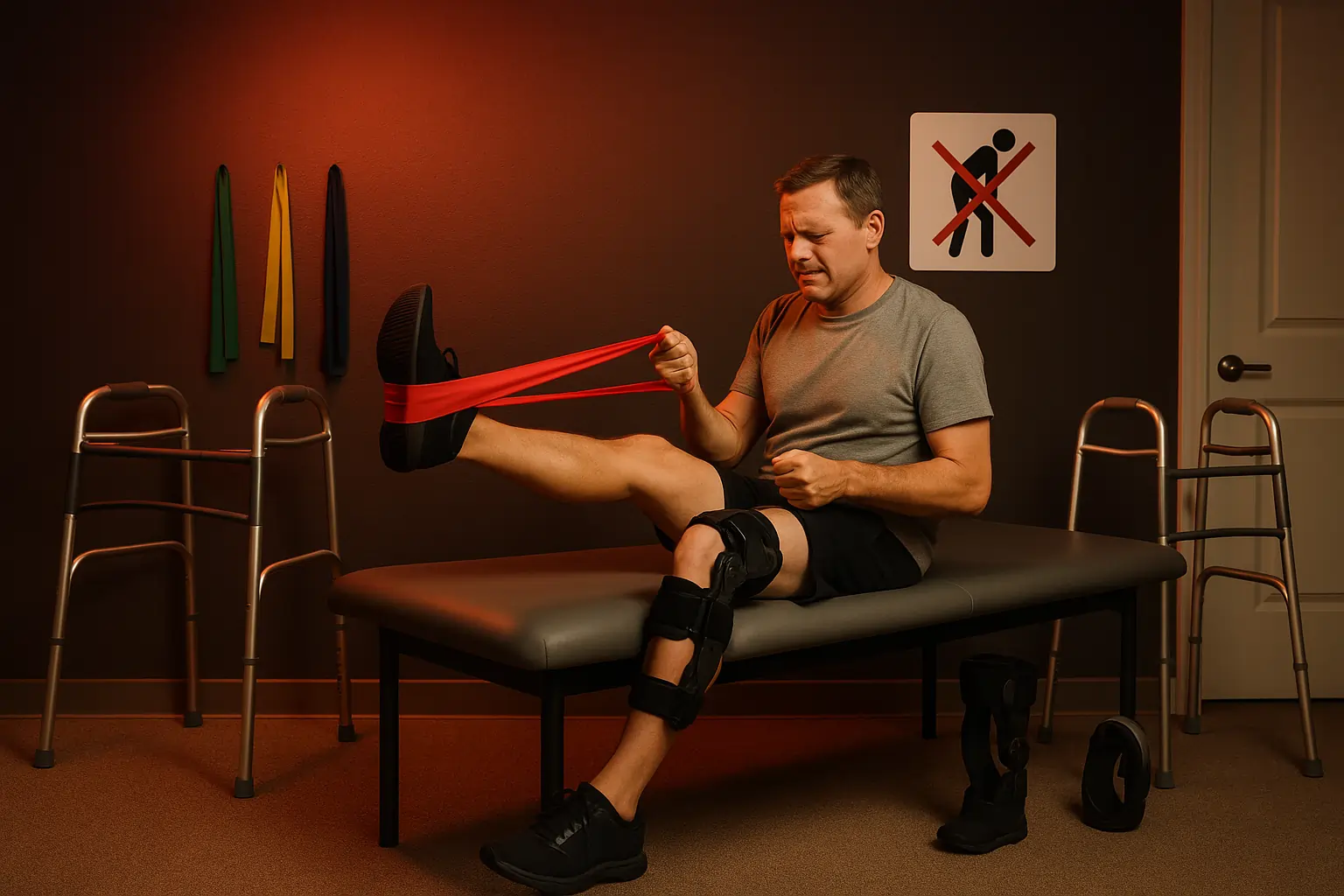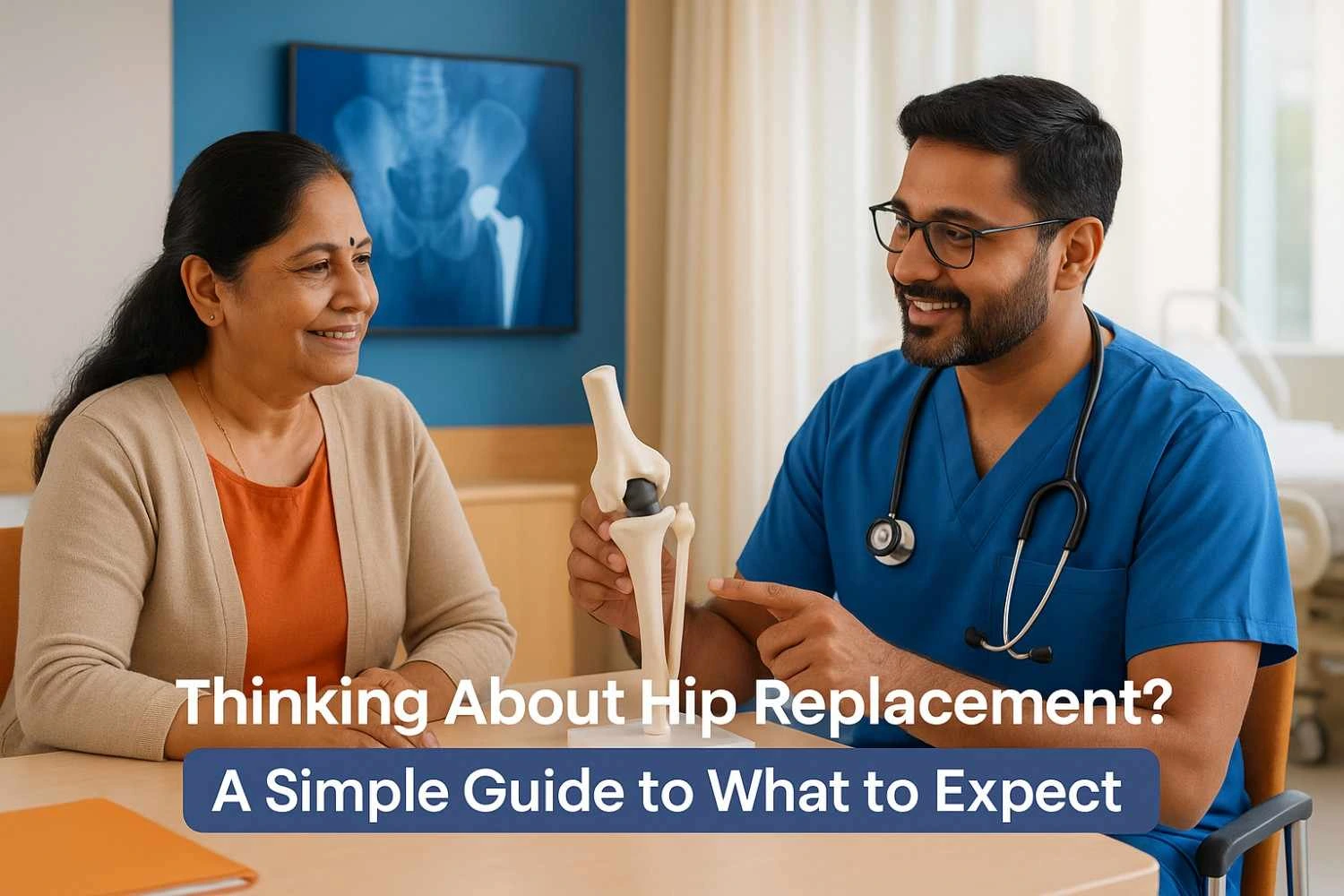Hello and welcome to the Germanten Hospitals blog. If you are reading this, you or someone you love is probably about to have, or has just had, joint surgery. First, we want to say – well done. Taking this step towards a life with less pain and more movement is a big decision.
We see it every day. A successful joint replacement is like a well-built house. The operation itself is the strong foundation and the sturdy walls. But the recovery period? That is the interior work, the plumbing, the electricals – it’s what makes the house a comfortable home. If this part is rushed or done wrong, even the strongest foundation can have problems.
In this article, we will walk with you through the most common mistakes patients make after joint surgery. More importantly, we will give you simple, clear advice on how to avoid them. Our goal is to make your journey back to an active life as smooth and quick as possible.
Let's first understand what happens inside your body after surgery.
Why Your Recovery Period is So Important
Think of your surgery as a controlled injury. The surgeon fixed the big problem, but your body now needs to heal. This healing process is delicate. Your tissues are repairing, muscles are getting used to the new joint, and swelling is going down.
What you do in the first few weeks and months sets the stage for your long-term result. A good recovery means less pain, better movement, and a joint that lasts for many, many years. A poor recovery can lead to stiffness, ongoing pain, and sometimes, even more problems.
At Germanten Hospitals, we don't just say goodbye after your operation. We will give you a detailed recovery plan. We are here to guide you, even when you are back home. This article is a part of that guidance.
Now, let's look at the common mistakes and how you can steer clear of them.
The 8 Most Common Mistakes After Joint Surgery
1. The "No Pain, No Gain" Myth: Overdoing It Too Soon
This is maybe the number one mistake. You wake up from surgery feeling good (thanks to the medicine!) and think, "I can do this!" So, you try to walk too much, climb stairs too soon, or get back to your household work.
- Why is this a problem? Your body uses swelling and pain as its alarm system. If you ignore these alarms, you can cause more swelling, more pain, and even damage the healing tissues around your new joint. This can set you back by weeks.
- How to avoid it:
- Listen to your body, not your brain. Your brain might be eager, but your body knows the true pace.
- Follow the "Goldilocks Rule." Not too much, not too little, but just the right amount of activity. Your physiotherapist will give you a plan – stick to it.
- Use your walking aid (walker or crutches) for as long as your doctor says. Don't be in a hurry to throw it away.
2. The Silent Sabotage: Skipping Your Physiotherapy
Physiotherapy (PT) is not optional. It is your daily job for the next few months. Some patients skip sessions because they are tired, in pain, or just don't feel like it. Others do the exercises but without any real effort.
- Why is this a problem? Surgery makes your muscles weak and your joint stiff. Physiotherapy is the only way to get your strength and movement back. Without it, your new joint won't work properly. You might end up with a permanent limp or a stiff knee/hip.
- How to avoid it:
- Treat PT like an important meeting. Schedule it in your day and don't cancel.
- Do your homework. The exercises you are given to do at home are just as important as the clinic sessions.
- Talk to your therapist. If an exercise hurts too much, tell them. They can adjust it. Don't just stop.
3. Playing the Hero: Poor Pain Management
There are two sides to this mistake. Some patients try to be "tough" and avoid taking their pain medicine. Others take it irregularly, waiting for the pain to become severe before having a pill.
- Why is this a problem? Severe pain stops you from moving and doing your physiotherapy. It affects your sleep and your mood. Your recovery slows down because you can't do the necessary exercises.
- How to avoid it:
- Stay ahead of the pain. Take your medicine on the schedule your doctor gave you, even if you don't feel terrible at that moment.
- Use ice packs. Ice is a fantastic natural pain reliever and reduces swelling. Use it for 15-20 minutes, several times a day.
- Be honest with your doctor. If the medicine isn't working or has side effects, call your doctor. Don't suffer in silence.
4. Ignoring the Red Flags: Signs of Infection or Blood Clots
After surgery, you need to be a detective for your own body. Some patients think that redness, warmth, or swelling is normal. It can be, but sometimes it's a sign of something serious.
- Why is this a problem? An infection in the new joint or a blood clot (Deep Vein Thrombosis) are serious complications. They need immediate medical care. Waiting too long can make the problem much worse.
- How to avoid it: Know the danger signs. Contact your
doctor right away if you see:
- Redness that is spreading from the incision.
- Pus or fluid coming from the wound.
- A fever above 100.4°F (38°C).
- Sudden, severe pain in your calf or thigh, with swelling, redness, and warmth.
5. Fueling Your Body Wrong: Poor Diet and Hydration
Your body is a construction site, and food is the building material. If you eat junk food and don't drink enough water, your body cannot heal properly.
- Why is this a problem? Healing requires extra protein, vitamins, and minerals. Without them, the repair work is slow. Dehydration can make you feel tired and dizzy, increasing your risk of falling.
- How to avoid it:
- Eat protein-rich food: Include dal, eggs, chicken, fish, paneer, and nuts in your daily meals.
- Load up on fruits and vegetables: They provide vitamins and fiber to help your body heal and prevent constipation (a common side effect of pain medicines).
- Drink water like it's your job. Keep a water bottle nearby and sip throughout the day.
6. The Comfort Trap: Falling Back on Bad Postures
After a knee or hip replacement, how you sit, sleep, and move is very important. It's easy to fall back into old, comfortable positions, like sitting on a low chair or crossing your legs.
- Why is this a problem? Some positions can put stress on your new joint and can even cause it to dislocate (pop out of place), especially after a hip replacement.
- How to avoid it:
- Use high chairs. Avoid low sofas and chairs. You may need a raised toilet seat.
- Don't cross your legs. This is a strict rule for hip replacement patients.
- Sleep with a pillow between your knees (for hip surgery) or under your ankle (for knee surgery) to keep your joint in a safe position.
7. Letting the Mind Weaken: Neglecting Your Mental Health
People often forget that recovery is a mental challenge as much as a physical one. It is normal to feel frustrated, sad, or even a bit depressed when you are stuck at home and dependent on others.
- Why is this a problem? A low mood can kill your motivation to do your exercises. You might isolate yourself, which makes the feelings worse.
- How to avoid it:
- Be patient with yourself. Recovery is not a straight line. Some days will be better than others.
- Stay connected. Talk to family and friends on the phone. Have visitors over. Don't sit alone all day.
- Set small, daily goals. Instead of "I want to walk normally," aim for "Today, I will walk to the kitchen and back three times." Celebrating small wins keeps you motivated.
8. Why Rushing Back to Work Can Cost You More
This is a bold point many don't want to hear. You might be eager to get back to your job, especially if you run your own business or feel pressure at work.
- Why is this a problem? Returning to work too soon, especially a physically demanding job, is a huge risk. It can undo all the progress you've made and lead to a setback that takes even more time off your life.
- How to avoid it:
- Have an honest talk with your doctor about a realistic timeline for returning to work.
- If you must return, start slowly. Maybe work from home for a few hours a day at first.
- Remember, this recovery is a short period in your long life. A few extra weeks of proper healing is better than a lifetime of problems.
Your Simple Week-by-Week Recovery Guide (Approximate)
Here is a general idea of what to expect. Remember, everyone heals at their own pace.
| Time Period | What to Focus On | What to Avoid |
|---|---|---|
| Week 1-2 | Rest, controlling pain and swelling, simple home exercises, short walks at home with a walker/crutches. | Long periods of sitting or standing, skipping pain meds, getting wet the wound. |
| Week 3-6 | Going to regular physiotherapy, increasing walking distance slowly, becoming independent in daily activities. | Walking without your aid if not cleared, sitting on low furniture, overconfident movement. |
| Week 7-12 | Building strength and stamina, returning to most daily activities, maybe driving (with doctor's okay). | High-impact activities like running, jumping, or heavy weight lifting. |
| 3 Months & Beyond | Gradually returning to sports and hobbies as approved by your doctor. Living your new, active life! | Stopping your exercises completely. Maintenance is key. |
Your Recovery Success Toolkit
- A Positive Mindset: Believe that you will get better.
- A Strong Support System: Family and friends who can help you.
- A Safe Home: Remove trip hazards like loose rugs, keep things you need within easy reach.
- Patience: This is the most important tool in your box.
How Germanten Hospitals Supports Your Journey
We know the thought of recovering away from the hospital can be scary. That's why our care doesn't end when you leave.
- Detailed Recovery Plan: You don't have to figure it out alone. We give you a clear, printed plan.
- 24/7 Helpline: Have a question at 2 AM? Call us. We are here for you.
- Follow-up Care: We schedule regular check-ups to monitor your progress.
- World-Class Physiotherapy: Our therapists are experts in joint recovery and will push you just the right amount.
Your New Beginning Starts with a Single Step
Recovering from joint surgery is a journey you walk one step at a time. By knowing these common mistakes, you are already ahead. You have the power to make your recovery a success.
Listen to your body, follow your doctor's advice, and be kind to yourself. Your future self, the one walking in the park, climbing stairs without pain, and playing with your grandchildren, will thank you for it.
Are you considering joint replacement surgery in Germany? Let the experts at Germanten Hospitals guide you. From your first online consultation to your full recovery, we are with you at every step. Contact us today, no-obligation opinion. Let's get you back to the life you love.




